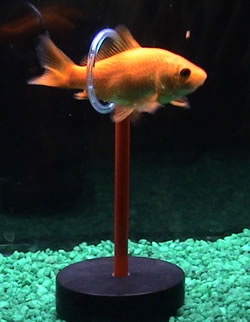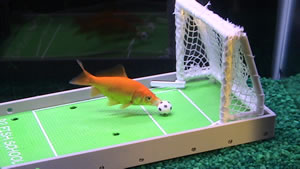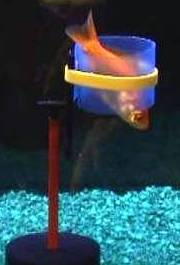Tag Archives: oscar
Like we didn’t already know – Fish are smart.
New research have shown that fish are much smarter than scientist previously thought and many fish species as just as intelligent as rats.
Dr Mike Webster of St Andrews University have researched the intelligence in fish and his research shows that fish shows clear signs of intelligence when they are in danger. He says that:
“It is probably accurate to say that many fishes such as minnows, sticklebacks and guppies are capable of the same intellectual feats as rats or mice.
Goldfish don’t have goldfish memories
His experiments have shown how fish use techniques learned through shared learning to avoid predators. He discovered that a fish that is separated from the shoal by a clear plastic divider will make its own decisions on how to avoid predators while a fish that is kept with other fish will decide on how to act by watching the rest of the fish and the choices they make.
Dr Mike Webster claims that “These experiments provide clear evidence that minnows increasingly rely on social learning as the basis for their foraging decisions as the perceived threat of a predator increases.”
He further claims that this dispels the old myths of goldfish memory and that fish have notoriously poor memories.
I am sure the fact that fish are smarter than they are given credit for doesn’t come as a surprise for any aquarist, especially not to aquarists that have kept South or Central American cichlids like jags and Oscars. Species that are know to depress if they get under stimulated and that sometimes (some specimens) don’t eat if the owner is away.
Interview with Dr Dean Pomerleau
Today we have a special feature here at the AC fish news blog. An interview with Dr Dean Pomerleau who train fish to do tricks. I posted about her work about a week ago in the post “Playing basketball with your goldfish?” and he has been kind enough to answer a few questions about his work and how to train fish. I know all of you would like to start reading the interview rather than my ingress so without further ado, here is the interview.
Lets start with a little about you. What’s your background?
I have a PhD in computer science / robotics. In my “real job”, I develop collision warning system hardware and software for cars and trucks. Specifically, systems that warn the driver when he’s drifting off the road due to drowsiness, inattention or distraction.
How come you started to train fish?

So one weekend day Kyle and I were sitting around looking for something to do, and we thought “wouldn’t it be cool if we could make our pet fish more interesting by training them.”
It has just snowballed from those humble origins.
Why Goldfish?
It is what we had. We’ve also trained other fish since then, including Betta, oscars, and parrot cichlids.
Have you ever tried to train fish that is generally considered smart than goldfish such as larger cichlids. Oscars as an example are know to be easy to teach tricks and some other large cichlids do best if they get a toy like a ping pong boll to amuse themselves with if kept alone?
Yes – check out the videos on our website (http://www.fish-school.com/gallery.htm) of our two trained albino Oscars (Snow and Ice). Snow was particularly good (and aggressive) at soccer. We had to get a bigger ball, since he was 5-6 inches at time. He’d pick up the tiny ball we’d been using for our goldfish in his mouth and swim around with it. We were worried he might swallow it!
Can you give our readers any tips if they want to train there fish?
I’d definitely suggest they purchase our kit, available at several on-line retailers. We’ve put a lot of careful research and engineering into the 20 pieces of equipment that come with the kit, and a lot of great information in the instructional DVD and printed manual. It includes step-by-step instructions to train your own fish at home to do all the tricks show in our video of Comet. To see the video, and learn more about the kit, your readers will want to visit http://www.r2fishschool.com.

Two goals really:
1) to bring the fun hobby of pet fish training to people everywhere, – especially kids. It helps teach persistence, patience, the power of positive feedback, even personal hygiene!
2) to raise awareness of fish sentience. I’m a long time vegan, and advocate for animal welfare. I like the fact that because of our success training fish, people everywhere are reconsidering the stereotype people have of fish in general (but especially goldfish) of having only a 3 second memory. Fish have a lot more going on ‘upstairs’ than they are given credit for, and deserve better treatment than they are given, either on our plates, or in crowded, polluted ‘fish farms’.
It was very gratifying when I was told a story about someone having seen one of our videos and deciding on the spot to stop eating fish, saying “if fish can do that, I’m not going to eat them anymore!”.
For more background, on motivation and philosophy, see:
http://blog.fish-school.com/2007/12/fish-school-philosophy.html
Do you see any practical application of your work? Will we see guard fish in the future?
Yes – definitely.

Trained fish for underwater mine
fish behavior management at zoos and aquariums:
Fish training at pittsburgh aquarium
Ppg aquarium visit part 1: sharks
Ppg aquarium visit part 3
“fish ranching”:
Fish ranching to replace fish farming
and entertainment:
What is the purpose of fish-school.com?
The goal of our website is entertain visitors, motivate them to try the fun hobby of fish training for themselves, and educate them about fish sentience.
What´s next for you and your work?
My goal right now and for the next year or two is to really help the new hobby of pet fish training take off. We’re excited to have a kit that people can now use to train their own fish at home.
I’m particularly enthused about a partnership we’re in the process of setting up with one of the leading distributors of science kits to primary school around the country. We are putting together a unit that will help teachers to use pet fish training in the classroom to teach the principles I mentioned earlier – persistence, patience, the power of positive feedback, even good personal hygiene!
It will be very gratifying to know that kids everywhere are learning important values based on what we’ve done.
Thanks for answering our questions Dean. I really appreciate you talking the time to do so.

